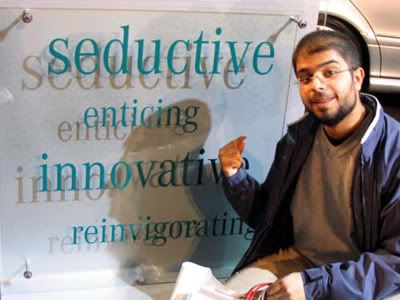Privacy? Wossat?
I remember watching Enemy of the State way back in the day, at the Trafford Centre in Manchester. I came out the cinema looking for CCTV cameras all around me. The feeling of paranoia soon wore off, however, and I went back to my confortable state of ignorance.
Fast forward eight years, and the paranoia is back. Sadly, I don’t see it leaving me quite so easily this time. I watched BBC 2’s awesome ‘The Money Programme’ [bbc.co.uk] the other night, which was all about how we’re increasingly watched and tracked by both business and the state.
Essentially, the argument boils down to this: there are good, solid business cases for the vast majority of surveillance that is conducted by companies. However, problems arise when staff no longer feel trusted, when that information can be obtained by the state, and when many seemingly disparate and innocuous pieces of information can be pulled together to paint a picture and track the movements of individuals.
I think I’m going to carry this theme forward a bit over the next few posts. To give a flavour of what’s in place today, think about the following. We receive itemised phone bills for our landlines and mobile phones. It’s handy for us to know who we’ve called, and to check that our bills are accurate. Phone companies are required to keep these logs of who, when and for how long we’ve called for several years. Mobile phone companies also record all the text messages we send and receive – and that includes the actual text content. On the internet, ISPs keep a record of all the emails we send and receive – including their content. They can also keep a log of all the websites we’ve visited. Then of course there’s Echelon, the shadowy electronic surveillance super-machine that intercepts and analyses hundreds of millions of digital communications (including voice) every hour of every single day.
But it’s not just our communications that are recorded. All our credit card and banking transactions are recorded electronically, too. ‘Loyalty cards’ record our buying habits, telling stores what we bought and when. Our movements are tracked by the UK’s network of an estimated 5 million-plus CCTV cameras. Some of these are capable of automatic number plate recognition. Automatic facial recognition isn’t far away. There are CCTV cameras on busses and trains. The London underground is expanding its current network of 6,000 cameras to 12,000 over the next five years. The Oyster card (a handy smartcard for public transport use in London) keeps a record of all the journeys you have made. Last year, the police requested these details for over 200 separate individuals. In the UK, we are caught on camera approximately 300 times every day.
And all that’s just for starters…
Fast forward eight years, and the paranoia is back. Sadly, I don’t see it leaving me quite so easily this time. I watched BBC 2’s awesome ‘The Money Programme’ [bbc.co.uk] the other night, which was all about how we’re increasingly watched and tracked by both business and the state.
Essentially, the argument boils down to this: there are good, solid business cases for the vast majority of surveillance that is conducted by companies. However, problems arise when staff no longer feel trusted, when that information can be obtained by the state, and when many seemingly disparate and innocuous pieces of information can be pulled together to paint a picture and track the movements of individuals.
I think I’m going to carry this theme forward a bit over the next few posts. To give a flavour of what’s in place today, think about the following. We receive itemised phone bills for our landlines and mobile phones. It’s handy for us to know who we’ve called, and to check that our bills are accurate. Phone companies are required to keep these logs of who, when and for how long we’ve called for several years. Mobile phone companies also record all the text messages we send and receive – and that includes the actual text content. On the internet, ISPs keep a record of all the emails we send and receive – including their content. They can also keep a log of all the websites we’ve visited. Then of course there’s Echelon, the shadowy electronic surveillance super-machine that intercepts and analyses hundreds of millions of digital communications (including voice) every hour of every single day.
But it’s not just our communications that are recorded. All our credit card and banking transactions are recorded electronically, too. ‘Loyalty cards’ record our buying habits, telling stores what we bought and when. Our movements are tracked by the UK’s network of an estimated 5 million-plus CCTV cameras. Some of these are capable of automatic number plate recognition. Automatic facial recognition isn’t far away. There are CCTV cameras on busses and trains. The London underground is expanding its current network of 6,000 cameras to 12,000 over the next five years. The Oyster card (a handy smartcard for public transport use in London) keeps a record of all the journeys you have made. Last year, the police requested these details for over 200 separate individuals. In the UK, we are caught on camera approximately 300 times every day.
And all that’s just for starters…



